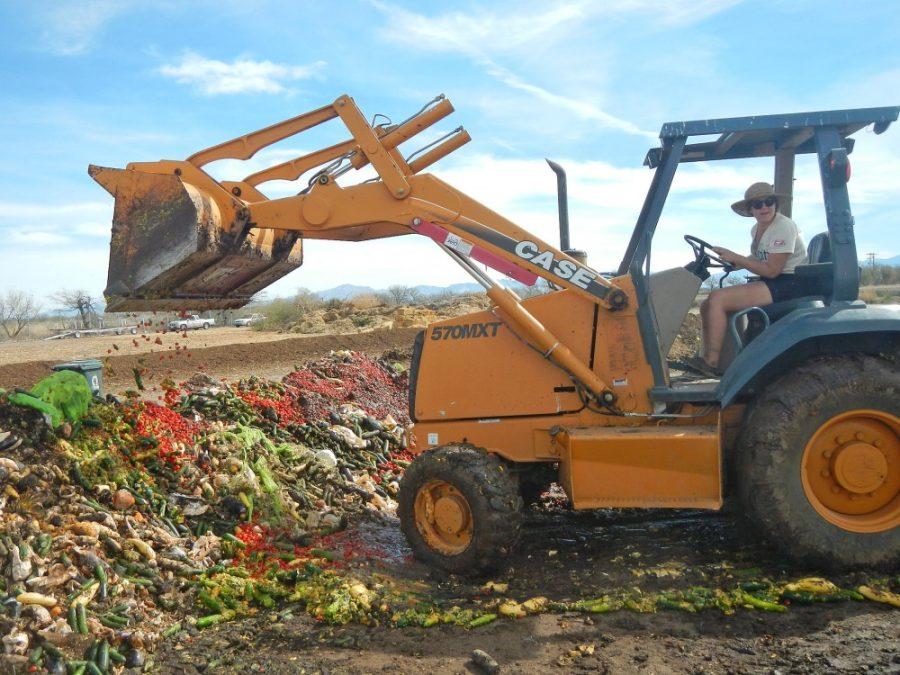Compost Cats, a University of Arizona program, was recently awarded over $100,000 in grants. Compost Cats is planning on using this money to set up a compost operation in Santa Cruz County.
Compost Cats is developing the operation “to compost the roughly 8,000 tons of produce from the bi-national produce industry currently ending up in Southern Arizona landfills every year,” according to a Compost Cats press release.
“Compost Cats mission is to transform organic, would be waste, like food scraps, manure, or brush, into soil amendments that we can reinvest into our food growing soils,” said Chet Phillips, Compost Cats Director. “And keep this waste out of landfills to avoid methane emissions and other damaging environmental effects.”
But that’s not all the program, which is a cooperative extension under the College of Agriculture and Life Sciences, does, according to Phillips. “Compost Cat’s other important role is serving as a student environmental leadership training program, because students get multifaceted job training,” he added.
That means students are integral, said Phillips. “We have a collaborative governance model, but we make almost all our decisions together. Students are involved in business planning, marketing, website, sales, heavy equipment, and soil monitoring.”
Related Article: Here’s how to have a sustainable semester
The operation in Santa Cruz will build on the successful model of Compost Cat’s current program, which has diverted over 15 million pounds of material from local landfills and currently provides composting services to over 70 businesses in Tucson.
The program has also provided green leadership training to over 60 University of Arizona students since the program began in 2011, according to a Compost Cats press release.
“We realized that food waste is an enormous national problem, and that it is particularly bad in Southern Arizona. Roughly 2 million tons of food cross the Arizona-Mexico border bound for all parts of the United States,” Phillips said. “So we wanted to be part of the regional solution.”
Due to the amount of produce coming from Mexico, Santa Cruz County has a produce waste dilemma.
“We’re going to employ Rio Rico High School students, community college students, and UA South students to conduct the Santa Cruz operation,” said Phillips. “These are additional student opportunities.”
Phillips hopes that working with Compost Cats as a high school student might encourage those students to attend the UA and continue their work with Compost Cats.
Compost Cats received an EPA Border 2020 Grant of $91,519, as well as a $10,000 Honorable Mention grant from the Rathmann Family Foundation “Mitigating Climate Change through the Use of Compost” Challenge Grant.
Border 2020 is the Environmental Protection Agency’s plan to increase environmental action along the United States border with Mexico. The EPA has five goals stated on their website, including promoting waste management.
With the operation in Santa Cruz, Compost Cats is embarking in a major waste management initiative.The program has connected with the EPA in the past. In 2016, the EPA awarded Compost Cats for outstanding efforts in food recovery.
The Rathmann Family Foundation was established in 1991, and provides grants to hundreds of organizations across the United States and the world. The Rathmann Challenge provides grants to “organizations with forward thinking ideas and a willingness to challenge themselves and their professional colleagues to come up with a better solution,” according to their website.
“The Rathmann Challenge was a new way to have a selective area where we could invite organizations we never heard from or had experiences with in the past,” Rick Rathmann, Executive Director of The Rathmann Family Foundation, said.
Related Article: UA makes sustainability competitive
Rathmann described some reasons why Compost Cats was selected for a grant over hundreds of other organizations.
“There was incredible commitment and resourcefulness displayed by the Arizona students and their leadership,” Rathmann said. “Absolutely inspirational.”
“Compost Cats have executed past programs beautifully and they are looking to the future,” Rathmann continued. “This shows to us that they have the right aspects to make an impact in years to come.”
Rathman reiterated how great it was to work with Compost Cats. “We are excited about seeing this as a beginning rather than an end. We’ll start conversations with Compost Cats in 2018 and discuss possibilities of continuing support,” Rathmann added.
Phillips believes that the operation in Santa Cruz will rapidly grow larger than the Tucson operation, in terms of materials composted.
Editor’s note: An earlier version of this story incorrectly referred to the Compost Cats as a club. They are a program of cooperative extension under the College of Agriculture and Life Sciences.
Follow the Daily Wildcat on Twitter








